- Home
- William Shatner
Captain's Glory зпвш-9 Page 3
Captain's Glory зпвш-9 Read online
Page 3
“Magnificent,” Doctor Burke said. “Neutrino flux peaked one hundred, twelve minutes ago when the star’s core collapsed. The shock wave is just about to reach the surface. We can expect the initial blast to begin within five minutes.”
“Shields on full,” Riker ordered, even though he doubted they’d be required. At a distance of only eighty million kilometers from a supernova, the Titan’s shields would likely not protect the ship for more than a minute or two, and he had no desire to stay in place long enough to test the estimate. Riker had learned from his mentor to err on the side of caution wherever possible.
“Shields on full,” Commander Tuvok confirmed. As tactical officer, the Vulcan who had served with such distinction on Admiral Janeway’s Voyager brought a wealth of welcome experience to Riker’s crew. He had kept the ship operating smoothly during the first forty-eight hours of the Titan’s encounter with the Araldii, when the newcomers’ intentions had been unknown. Once their peaceful and cooperative nature had been confirmed, both by their willingness to share scientific data and Troi’s own empathic sensitivity, Tuvok had concerned himself solely with the safety precautions required for being so close to a star about to explode.
“Neutrino flux has dropped to zero,” Burke announced. “This is it.”
Riker instinctively wrapped his mind around the relativistic effects he had to account for in the next few minutes. He knew that neutrinos traveled at the speed of light. The fact that the ones produced in the core of Salton Cross were no longer being detected at this distance meant that the fusion reactions at the heart of the star had stopped four minutes and twenty-seven seconds ago. That was the brief time it took neutrinos to travel eighty million kilometers.
The visual image on the viewscreen, however, was constructed by subspace sensor data that propagated at faster-than-light speeds. Most important, that meant he could see the star as it was now.
As Riker watched intently, the star-abruptly– began to grow smaller, as if the Titan were already warping away.
“There it goes,” Burke said with excitement. “The star is collapsing-there’s no outward pressure of internal fusion reactions to counteract the inward pull of gravity.”
Riker held a hand near his face, as did everyone else on the bridge. Even with visual safeguards in place, the flash of light was going to be strong.
“Criticality in seven… six… five… four… three…”
Burke’s countdown was interrupted.
Two seconds ahead of her best estimate, Salton Cross went supernova.
Over the past few weeks, Riker had come to know Burke well enough to realize that she would be thrilled to have miscalculated and would already be mentally revising her model of the star’s interior processes.
The main viewscreen went white.
Thanks to the preparatory sessions Burke’s team had conducted for interested Titan crew, Riker understood why. Slightly less than four minutes and twenty-seven seconds away, a deadly wave of radiation was streaming toward his ship. It would be followed by a slightly slower though even more destructive wall of ejected solar plasma.
The radiation had the capability to knock out every system on Titan, including the shields. And if those failed, every member of the crew would be fatally irradiated within seconds. A few minutes later, when the shock wave hit the ship, the Titan would be shattered, likely into its component molecules.
Riker had no intention of waiting for any of that to happen.
“That’s it, Aili… take us out, warp factor point nine five.”
“Point nine five it is, Captain.”
Riker leaned back in his chair, smiled at Troi. “Best seats in the house,” he said.
In that same instant the main alarm sounded and red lights flashed.
The Titan violently pitched forward, then down.
Riker swiftly scanned his bridge. Under present conditions, the strength of that lag in the inertial dampers could mean only one thing: The ship had dropped out of warp as quickly as it had jumped to it.
“Report!” he said, but already his eyes had found the source of the trouble: Every warning light at the engineering station flashed red.
Riker’s conn officer fought to keep Titan’s dampers and structural-integrity field in alignment.
“Engineering reports warp core offline,” Tuvok calmly announced over the alarms.
“Maximum impulse!” Riker ordered. Though they couldn’t reach light speed on impulse alone, increasing the distance between the radiation shock wave and the ship would buy his ship a few more seconds. “Bridge to engineering!”
The Titan’s chief engineer, Doctor Xin Ra-Havreii, answered at once, voice uncharacteristically tense. Riker could hear shouted commands and rapid conversations in the background. “Engineering, Captain.”
“How soon can you bring warp drive back online?” Riker asked, urgent.
“It is online-the core’s building toward a breach! This is a full-scale– ” There was a pause, then Riker heard the Efrosian engineer swear in one of his homeworld’s more obscure dialects.
“Stand by, Captain! Initiating emergency core ejection!”
Riker’s ship shuddered. All alarms switched off.
“Warp core away,” Ra-Havreii said.
A moment later, the ejected core detonated less than a kilometer from the ship.
The too-close explosion drove subspace concussion waves into the Titan, overloading its shields and sending a compression pulse through all major circuits.
The lights on the bridge flickered off.
The main viewscreen winked out.
The ship’s computer network was down.
Riker was on his feet. Battery-powered emergency lights glowed, but the display screens at all stations flashed with random static.
All hands on the bridge turned to their captain for his orders.
But the Titan hung dead in space.
And less than four minutes away, a wall of radiation raced forward at 300,000 kilometers each second to ensure the same fate would soon befall her crew.
3
S.S. BELLE REVE, VULCAN
STARDATE 58552.2
“Give me one good reason why I shouldn’t have you court-martialed,” Admiral Janeway said. “In fact, I could use a good reason for not just chucking you out of the airlock right now.”
Captain James T. Kirk sat back on his bench in the narrow galley of the Belle Reve and realized he had no answer for the admiral-at least, not one that he’d accept if he were in her position.
He wasn’t surprised by Janeway’s frustration with him. He knew it had been building for several months, so he couldn’t even feign innocence, which was usually one of his better strategies.
He was guilty as charged and that was all there was to it.
A year ago, when he had been on board Captain Riker’s Titan, Janeway had given him the ship he now commanded. Then, it had been called the Calypso, but as the ship’s new master he’d changed her name to Belle Reve-Beautiful Dream.
What better name could there be for a ship that sailed among the stars? Except, perhaps, for Enterprise.
According to the central registries, the S.S. Belle Reve was a commercial freighter of Rigelian registry. Her main hull was a blunt-nosed cylindrical module about the same size as a single nacelle from an old Ambassador-class ship. She had a slightly tapered bulge at the rear of her ventral hull, and two swept-back, outboard warp nacelles. The nacelles were also cylindrical. To Kirk’s eye, they gave his ship the look of an antique.
But, more significantly, what the old-fashioned configuration hid was a cleverly engineered distributed-phaser system. Its critical components were spread throughout the ship so that they could be powered up without being detected. Binary quantum torpedoes shared the same characteristic: They didn’t go “live” until their warhead components were mated just two seconds before launch. Until that last moment of assembly, even the sensors on Jean-Luc Picard’s Enterprise would have trouble detecting su
ch uniquely arrayed armaments.
When its Defiant-class warp engines were added to the mix, making the small ship vastly overpowered and exceedingly fast, all the ingredients for being one of Starfleet’s best Q-ships were in place.
In the vernacular of an earlier time, Kirk’s Belle Reve was a spy trawler that sailed where Starfleet chose not to fly its colors.
“I’m waiting,” Janeway said.
Kirk decided to rely on a tried-and-true technique: He answered the question he felt she should have asked him.
“I think I’ve done a good job of fulfilling my obligations to you.”
Janeway blinked as if she hadn’t heard him correctly.
“Captain,” she said, more than a hint of irritation in her tone, “I came all this way because you haven’t fulfilled your obligations.”
Kirk spoke lightly, but his words carried serious intent. “Is that what you really think? Or is that what Starfleet told you to say?”
Janeway leaned forward, punctuating her words by tapping her finger against the galley table. “I gave you this ship so you could be the eyes and ears of Starfleet where and when we can’t send an identifiable ship of our own.”
“You gave me this ship so I could investigate Spock’s disappearance.”
Janeway would not be deflected. “Captain Kirk… Ambassador Spock is dead.”
Kirk felt his chest tighten, but he restrained any show of frustration. It had been years since he had been subjected to Starfleet’s chain of command, even longer since he felt he owed it any particular allegiance.
“We don’t know that,” he said. The dream was vivid in his memory: Do I have your attention?
“I read your report about the events on Remus.”
“Then you also know Spock was absorbed by an unknown phenomenon– “
Janeway interrupted to correct him. “Disintegrated.”
Kirk continued as if she hadn’t spoken. “– and his fate remains undetermined.”
Janeway shook her head. “Is that what this has been about?” she asked. “You’re not just looking for the people responsible. You really think he’s still out there?” The admiral’s voice held both pity and annoyance. The combination was not lost on Kirk. But he didn’t take the bait.
“Of course I do,” he said. The dream wasn’t evidence he could share with her. But there was other proof. “I saw what Norinda was capable of. The shapeshifting– “
With a wave of her hand, Janeway cut him off again. “I know all this. The changing into clouds of dark smoke, mounds of black sand, cubes of different sizes…”
Kirk paused a moment, struggling to keep his vivid recollection of Spock’s disappearance, and the revulsion and the fear it came with, from weakening the case he knew he had to make. “Norinda controlled a technology-or natural abilities-beyond our capacity to define them. Spock might be dead. But he might just as well have been taken by an alien transporter.”
Janeway got up from her bench, then walked to the replicator to study its controls. Kirk understood that the admiral was trying to prevent herself from saying something she might regret. They were both attempting to restrain themselves.
Janeway punched the code for coffee, standard. “One more time,” she said. “You saw him disintegrated before your eyes.”
Kirk joined her by the replicator, waited until she’d taken her coffee mug. “I’ve seen Spock ‘disintegrated’ thousands of times in transporter beams.” He punched the controls for a Vulcan espresso-no caffeine.
“Then for all the times you’ve been ‘unavailable’ for special duty, why haven’t we found you heading back to the Romulan home system?”
Kirk held his coffee cup in a mock toast to Janeway. She merely cupped her own mug for warmth.
“Because,” Kirk said, “Norinda failed to provoke a civil war between Romulus and Remus and the Jolan Movement fell apart after her disappearance.” He took a sip of the hot liquid, detecting as always the loss of authenticity in replication. “As Spock would say, whatever her ultimate goal, logic suggests she’s trying to set up a new movement on another world.”
Janeway stared at him with something close to suspicion. “At your debriefing, you told the review board exactly what Norinda’s ultimate goal was.”
“I told the review board what Norinda said was her ultimate goal. There’s a difference.”
“What?” Janeway demanded.
Kirk stayed silent for a moment. He had originally encountered the shapeshifting alien life-form called Norinda in the early months of his first five-year mission as captain of the Enterprise, NCC-1701. She had lied to him then, told him a story about having escaped from “the Totality”– an ominous alien force that had somehow conquered the Andromeda Galaxy.
A lifetime later, he had met her again on Remus, where she claimed to lead a peace movement that had been banished from Romulus. But all the while, it was Norinda and her followers who’d been attempting to start the very civil war that she claimed to oppose.
“She told me she’d make the Romulans and the Remans want peace by exposing them to war,” Kirk said. “She said her goal was to leave both planets in ruins, with millions dead, because only then would the survivors realize the value of love.”
“But you don’t believe that.”
Kirk’s mind filled with images of all the different forms in which Norinda had appeared to him, remembering how she’d used some kind of subconscious telepathy to assume the appearance of the woman most desired by whomever she happened to speak with.
“She’s a monster,” Kirk said at last. “The only peace she can bring is that of the grave. She even appeared to my son as his mother.”
Kirk had had this discussion a year ago. He had settled it then. He settled it now. “I believe all Norinda wants is destruction. To her, the only world that can be at peace is a world without life.”
Janeway hesitated, then seemingly changed the subject of their conversation.
“Have you ever thought that Starfleet’s goals and yours might not be that far apart?”
“Admiral, if you’re looking for common ground, you’re not going to find it. I want to rescue Spock. Starfleet thinks he’s dead.”
“But it’s obvious to me that you’re trying to find Spock by tracking down Norinda. I suggest that’s where our goals converge.”
Kirk reconsidered what he knew of Janeway. She was shrewd, immensely capable. She had brought her ship and her crew back from the wilds of the Delta Quadrant with honor. Her promotion to the admiralty had been a foregone conclusion. He even found her quite attractive and thought he could find her more so, if she ever decided to stop being an admiral for a day.
But he also knew that she was more solidly connected to Starfleet than he had been or ever would be, now. Like his friend Jean-Luc, Kathryn Janeway could be relied upon to put the needs of Starfleet and the Federation first. Except, of course, in cases of egregious misconduct.
But for Janeway, in those circumstances for which there were no clear-cut divisions between right and wrong, Starfleet would always be right by default, until proven otherwise.
Which means, if Starfleet is searching for Norinda… Kirk paused in the midst of that thought.
“I’ve always suspected there was something you weren’t telling me,” he said. “The day you offered me this ship, I sensed it. Right now, I’m feeling it even more.”
“Now you’ve changed the subject,” Janeway said. She gave Kirk a tight smile.
“You’ve given me seven missions this past year. I took them all.”
“You completed four.”
“You called off my surveillance mission to the Neutral Zone before I could reach it. The Andorian political prisoner you asked me to ‘escort’ to Deep Space Nine died en route-complications of torture.”
“Suffered at the hands of the Klingons,” Janeway said as she carefully placed her untouched coffee on the galley countertop. “Not Starfleet.”
“So that only leaves one mission i
n contention,” Kirk said.
“There’s no contention. You were ordered to Inver Three. You refused to go. And a Starfleet covert observer team was lost as a result. Which brings us back to your court-martial.”
“My son is on this ship,” Kirk said. “My friends, Bones and Scotty. All of us civilians. Inver Three was unsafe. You needed to send in a recovery team. Not a spy ship.”
“You were the recovery team,” Janeway said accusingly. “An extraction team never would have made it through planetary defenses. But the Belle Reve wouldn’t have been questioned. Six men and two women would be alive today except for your refusal to obey orders.”
“If you had asked me, I would have gone. But I don’t put the innocent in harm’s way. And the Starfleet I know wouldn’t think of it.”
That was when Kirk decided he had had enough of explaining and defending himself-to Janeway, and to Starfleet. He turned his back on such reminders of his old life. He headed for the open door that led to the central corridor, and his new life.
Kirk stepped into the corridor, remembering to duck his head while passing through the small hatch opening; the painful lessons of a year on this cramped vessel had taught him to be more mindful. This main passageway-barely wide enough for two people to stand side by sidewas similarly constricted. Anyone taller than two meters had to contend with low-hanging overhead conduits and light fixtures.
Behind him, he heard the clanking of Janeway’s boots on the corridor’s metal-grid decking.
“Kirk-you can’t walk away from this. We had a deal.”
Kirk kept moving toward the interdeck ladder. “My deal was that I wouldn’t place my crew in danger.” He couldn’t say it more plainly than that. A few quick steps more and he reached the ladder leading up to the bridge. The Belle Reve had a single turbolift, but he preferred to climb whenever he could. The gym on the ship was little more than a treadmill with an erratic gravity adjustment.
“Captain Kirk! Get back here.”

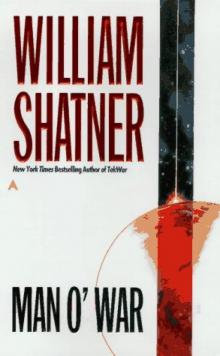 Man O' War
Man O' War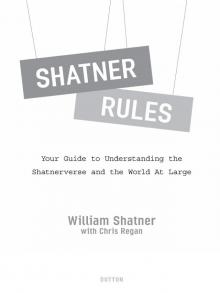 Shatner Rules
Shatner Rules Leonard
Leonard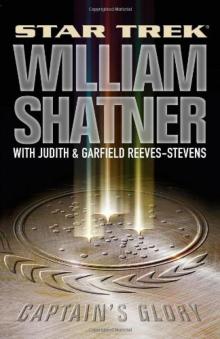 Captain's Glory
Captain's Glory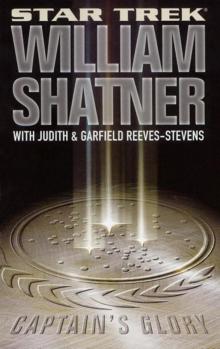 Captain's Glory зпвш-9
Captain's Glory зпвш-9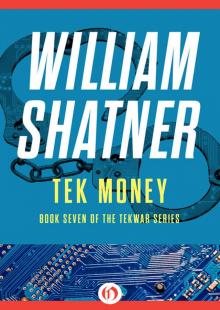 Tek Money
Tek Money Spirit of the Horse
Spirit of the Horse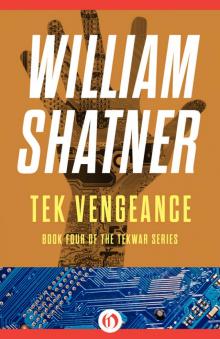 Tek Vengeance
Tek Vengeance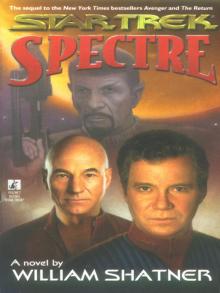 Spectre
Spectre Zero-G
Zero-G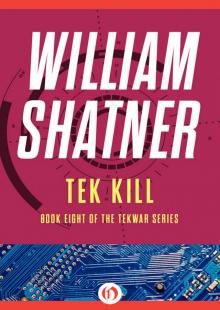 Tek Kill
Tek Kill Collision Course
Collision Course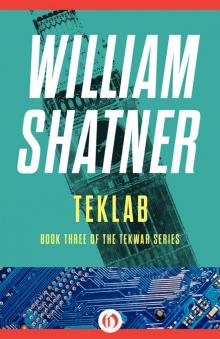 TekLab
TekLab Up Till Now
Up Till Now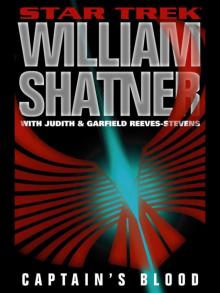 Captain's Blood
Captain's Blood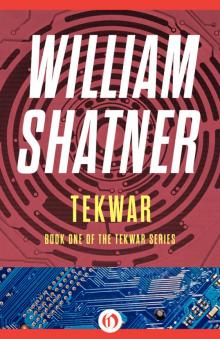 TekWar
TekWar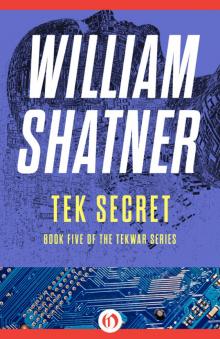 Tek Secret
Tek Secret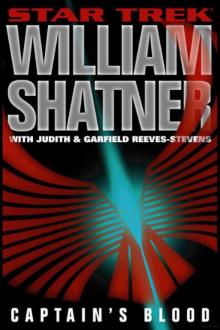 Captain's Blood зпвш-8
Captain's Blood зпвш-8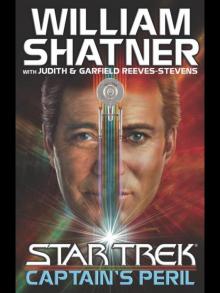 Captain's Peril
Captain's Peril Live Long and . . .
Live Long and . . .